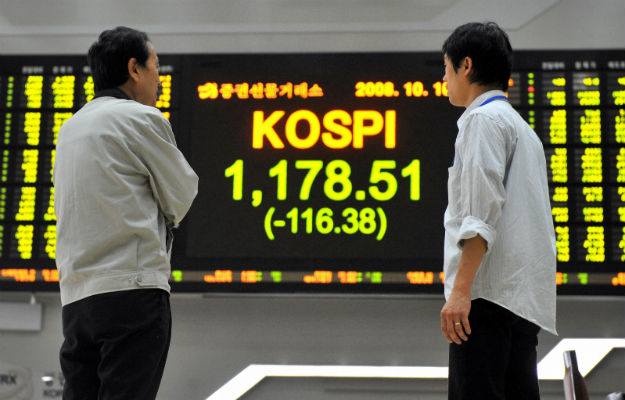 中国能够避免成为第二个日本吗?在几十年的时间内,我们也许就会谈到,现在蒸蒸日上的经济强国会如何像日本一样,陷入经济预期下降的困境之中。但是在这之前,另外一个国家会首当其冲:那就是韩国。
中国能够避免成为第二个日本吗?在几十年的时间内,我们也许就会谈到,现在蒸蒸日上的经济强国会如何像日本一样,陷入经济预期下降的困境之中。但是在这之前,另外一个国家会首当其冲:那就是韩国。
虽然中韩两国的政治状况和疆域大小存在显著差异,但是人们认为,中国代表了韩国的过去,日本则有可能是中国的未来。像中国一样,韩国靠生产全球产业链中的低端产品发家;韩国经济发展的动力也来源于从农村向城市的人口迁移以及利用廉价劳动力而成功开拓的出口市场。就像日本一样,韩国的出口商品在起步阶段名声并不好,比如现代汽车第一次进入美国市场之时,不过它们最终变成了广泛接受的国际品牌。但是日本在两大经济引擎——城市化和低成本出口商品——耗尽之后,便止步不前,而且现在可能又陷入了经济衰退之中。
从某种程度上来说,韩国正在步日本后尘。韩国与日本的诸多相似之处可视为不祥之兆:其经济增长率从二十世纪90年代早期开始就持续下降,整体发展趋势也是重蹈日本覆辙,只不过比日本延后大约20年。韩国与日本在城市化方面则有接近15年的差距,但是二者的相似性也是显而易见。另外,15年后,韩国人口的年龄结构也很有可能与日本当前的人口结构非常相似。韩国和中国之间也可以做类似的比较,中国比韩国落后15或20年。
这些国家的共同点还不仅仅局限于地理位置和经济发展趋势。在上述三个国家,中央政府都是工业发展高峰的幕后推手。在工业高速发展的过程中,人们的生活水平迅速向富裕发达国家靠拢,当然只是在一定程度上而已。
这些国家所面临的难处就是如何缩小还未消除的差距。从小泉纯一郎政府开始,日本做出了些许努力,寻找新的发展途径:他们接受了自由市场、拆分了被称为“经连体”( keiretsu)的大型产业集团、打击贪污腐败,还教育年轻人懂得竞争的价值。然而,日本最终没能成为全球创业中心,而企业的聚集正是后一体化时代经济增长的根本动力。随着人口老龄化迅速蔓延,日本人口很快就会缩减,其经济进一步发展的前景实在不容乐观。
韩国将会紧随其后,面临这些挑战。类似于日本经济和日本的“经连体”,控制韩国经济的是少数大财阀(chaebol)——覆盖多个产业的大型企业集团(不包括银行),在过去十年里,它们所占的GDP比重稳步攀升,可能已经达到75%以上。此时的韩国需要活力四射的中小企业发展壮大,但是整个私营部门却日益限于臃肿庞大的企业寡头控制之下。
除了大财阀一手遮天以外,韩国人还应该担心他们根本的经济体制状况。专业学者和智囊班子评估了韩国的经济自由度、财产权的稳健与否和对投资者的保护力度,认为韩国落后于日本、台湾和许多其他的富裕国家。尽管在韩国做些平常的生意可能相对简单,但是其经济环境为规模小的竞争者提供的有利条件少之又少,使它们无力与大企业展开角逐。
韩国也同样有东亚经济强国的其他传统劣势。其商业文化根源在于儒家文化,所以企业的资历比业绩更加重要,人际关系网也比一纸合同来得更有意义。韩国的教育体系注重死记硬背、给学生施加压力、让他们循规蹈矩,把他们变成了在大企业和政府机器中机械工作的齿轮。尽管在韩国前总统卢武铉的政策带动之下,外来移民数量有所增长,但是韩国的创意课程仍然未能达到国际标准,韩国的文化也对新思想和外来人口也持谨慎态度。
当然,韩国也有许多有利于经济发展的条件。其科研机构的资金补助和研究成果的数量在世界范围内名列前茅,其教育体系让孩子们在科学、数学和问题解决能力上得分颇高。人们对职业道德的恪守和对国家项目的投入也远远超越其他国家。事实上,后者足以吸引不合的北部邻国与其统一,它们之间除了意识形态有时会有不同,其他的方面并无二致。
不过,对韩国的经济发展最有利的条件就是它有机会从邻国的失误中吸取教训、学习经验。日本也曾经获得重塑其经济的契机,公开选择或者用其它方式选择不再延续之前的错误做法。可以看出,中国比韩国更加强硬,在其急速的经济增长缓慢平息之后,其政治体系仍然不可撼动,这限制了资本的自由流通和思想的自由传播。
韩国则是一个相对民主的国家,在接下来的几年当中会为下一阶段的经济发展做准备。如果一切顺利,则东亚地区的最大问题则会从“中国能避免成为第二个日本吗?”变为“中国能否跟随韩国的脚步?”
Can China avoid becoming Japan? In a few decades' time, we may be talking about how today's up-and-coming economic superpower is starting to look like the Land of the Rising Sun and Falling Expectations. But before that, another country is first in line: the Republic of Korea.
Despite differences in politics and size, China can be seen as representing South Korea's past and Japan its possible future. Like China, Korea prospered by picking the low-hanging fruit of globalization; its growth was driven by the rural-to-urban migration of its population and the successful pursuit of export markets using low-wage labor. And as in Japan's case, Korea's exports started out with a less-than-savory reputation -- such as when Hyundai cars first reached the United States -- but eventually became accepted global brands. But after Japan exhausted the economic engines of urbanization and low-cost exports, it stopped growing -- and now may be slipping into recession again.
In some ways, South Korea is already on the same track. There are a number of ominous parallels: Korea's rate of economic growth has been falling since the early 1990s, and its overall trend tracks Japan's with a delay of about 20 years. In terms of urbanization, the lag may be closer to 15 years, but the resemblance is clear. Also, the age profile of Korea's population 15 years from now will likely be very close to Japan's today. You can make similar comparisons between Korea and China, which sits another 15 or 20 years behind.
These countries have more in common than their geography and economic trends. In all three, the biggest spurts of industrial growth were managed by their central governments. During these spurts, their living standards converged quickly to those of more economically advanced countries -- up to a point.
The hard part has been closing the remaining gap. Beginning with the government of Prime Minister Junichiro Koizumi, Japan has made a halfhearted effort to find a new path by embracing free markets, dismantling the corporate behemoths known as keiretsu, cracking down on corruption, and even teaching its young people the value of competition. Ultimately, however, Japan has failed to become a global hub for entrepreneurship -- an essential driver of post-convergence growth. With a rapidly aging population that will soon begin to shrink, the prospects for further expansion in the Japanese economy are less than sunny.
Korea is next in line to face these challenges. Like Japan's economy and the keiretsu, Korea's economy is dominated by a handful of chaebol -- enormous conglomerates that cover many industries (excluding banks) and whose share of GDP, after climbing steadily for the past 10 years, may be higher than 75 percent. At the very moment that Korea needs dynamic small and medium-sized businesses to flourish, the private sector as a whole is becoming more dominated by lumbering oligopolies.
In addition to the chaebol's dominance, Koreans should be worried about the state of their underlying economic institutions. Academics and think tanks rate South Korea's level of economic freedom, the robustness of its property rights, and its protection of equity investors below those of Japan, Taiwan, and many other wealthy countries. Although the day-to-day processes of doing business may be relatively easy in Korea, its economic environment offers few advantages to a small contender pitted against much bigger players.
Other traditional gripes about the East Asian powerhouses also apply to Korea. Its business culture has Confucian roots, so seniority and personal networks can mean more than merit and written contracts. Its education system emphasizes memorization, instills a pressure to conform, and mainly prepares students to work as cogs in big corporate or government machines. Its creative class is underdeveloped by international standards, and its culture is reticent about new ideas and new people, though immigration has ticked upward thanks to the policies of former President Roh Moo-hyun.
Of course, Korea has many economic assets as well. Its scientific research institutions rank among the best funded and most productive in the world, and its education system does produce high scores in science, math, and problem-solving. Its people's work ethic and their commitment to the national project are exceptional. In fact, the latter can be fervent enough to recall the republic's estranged neighbor to the north, which seems at times to differ in ideology but little else.
Yet the best thing Korea has going for it may be the opportunity to see and learn from its neighbors' mistakes. Japan had the chance to reinvent its economy and chose, explicitly or otherwise, not to follow through. China arguably has it tougher than Korea: Its political system may still be entrenched after its breakneck growth subsides, constraining the free flow of capital and ideas.
Korea, in contrast, is a democracy with several years left to prepare for the next stage of its economic development. If all goes well, the big question in East Asia will change from, "Can China avoid becoming Japan?" to "Can China follow Korea?"
 中国能够避免成为第二个日本吗?在几十年的时间内,我们也许就会谈到,现在蒸蒸日上的经济强国会如何像日本一样,陷入经济预期下降的困境之中。但是在这之前,另外一个国家会首当其冲:那就是韩国。
中国能够避免成为第二个日本吗?在几十年的时间内,我们也许就会谈到,现在蒸蒸日上的经济强国会如何像日本一样,陷入经济预期下降的困境之中。但是在这之前,另外一个国家会首当其冲:那就是韩国。
